Overview
In today's healthcare landscape, providers often face overwhelming emotional challenges. Administrative tasks can weigh heavily, detracting from the essential focus on patient care. How often do you find yourself buried in paperwork, wishing you could dedicate more time to your patients?
This is where innovative AI technologies come into play. Applications like CosmaNeura and Microsoft 365 Copilot are designed to alleviate these burdens. By automating administrative tasks and enhancing patient interactions, these tools empower healthcare providers to prioritize what truly matters: patient care.
Imagine a world where operational efficiency is improved, and patient outcomes are significantly better. With AI, healthcare professionals can shift their focus away from tedious documentation processes. This transformation not only boosts efficiency but also fosters a more compassionate care environment.
We encourage you to explore these advancements and consider how they might benefit your practice. Together, we can embrace the future of healthcare, ensuring that every patient receives the attention and care they deserve.
Introduction
In an age where healthcare is increasingly intertwined with technology, many providers are feeling the weight of administrative burdens that can detract from patient care. Innovations are reshaping how care is delivered and operations are managed, but these changes can also be overwhelming. How can we ensure that technology serves as a supportive ally rather than an additional stressor?
AI-driven solutions are emerging to tackle these challenges, automating administrative tasks and enhancing patient interactions. Platforms like CosmaNeura and Google Gemini 2.0 are streamlining workflows, offering relief to providers and improving patient satisfaction and outcomes. Imagine a world where healthcare professionals can focus more on their patients and less on paperwork.
As the industry grapples with the pressing need for efficiency and accuracy, tools such as Microsoft 365 Copilot and Verbit are revolutionizing documentation practices. These innovations not only simplify processes but also empower providers to deliver compassionate care. Companies like AppTek are breaking down language barriers in telehealth, ensuring that every patient feels understood and valued.
This article explores the transformative impact of these cutting-edge technologies. Together, they empower healthcare providers to focus on what truly matters: delivering effective and compassionate patient care. Join us as we delve into these solutions and discover how they can enhance your practice.
CosmaNeura: Streamlining Administrative Tasks for Healthcare Providers
In today's healthcare landscape, many providers face overwhelming emotional challenges due to administrative burdens. CosmaNeura is here to help, transforming medical services by automating essential tasks like client intake, triage, and documentation. Imagine a world where medical practitioners can focus on delivering high-quality care, free from the weight of excessive paperwork. This shift not only improves operational efficiency but also upholds ethical standards in medical service delivery.
Consider the impact of these innovations:
- Doctors can optimize appointment scheduling
- Manage medical records
- Streamline billing processes
This recovery of valuable time leads to enhanced job satisfaction and . With a staggering 86% of mistakes in attributed to administrative errors, the need for such advancements is undeniable. By automating repetitive tasks, CosmaNeura empowers clinicians to prioritize higher-value activities, fostering a more engaged and fulfilled workforce.
As we look toward the future, it's important to recognize that AI is projected to contribute $2 trillion of business value across various sectors. For medical institutions aiming to enhance operational capabilities while safeguarding individual data, investing in secure AI solutions like CosmaNeura is essential. Adopting these AI technology apps not only alleviates administrative pressures but also prepares practitioners for success in an increasingly digital medical environment. Are you ready to embrace this change and improve your practice's efficiency and patient care?
Google Gemini 2.0: Enhancing Patient Interactions with Advanced AI
Google Gemini 2.0 marks a significant step forward in , thoughtfully designed to foster more natural and effective interactions between individuals and medical professionals. Its multimodal capabilities integrate text, images, and audio, creating richer communication that enhances understanding and engagement. This innovative AI technology app streamlines information exchange and significantly enriches the overall experience, making interactions more informative and engaging. This highlights the growing recognition of AI’s role in medical services. Furthermore, 58% of medical executives express a likelihood to adopt generative AI solutions within the next year, indicating an accelerating momentum for AI integration.
A compelling case study titled 'Doctors' Confidence in AI Capabilities' shows that medical professionals generally believe AI can positively impact their field, with pathologists exhibiting the highest confidence in AI’s ability to assist in determining patient prognoses. This optimism among practitioners reflects a rising acceptance of AI as a valuable tool in clinical practice, crucial for overcoming traditional resistance to innovation.
As medical professionals increasingly embrace these tools, the potential for improved patient-provider communication becomes evident, paving the way for a more efficient and compassionate healthcare landscape. However, it’s essential to remember that while AI enhances communication, the human element in medical care remains vital. Technology should support, not replace, the compassionate assistance that individuals need. How can we ensure that this balance is maintained as we move forward?
Microsoft 365 Copilot: Automating Documentation for Healthcare Efficiency
Microsoft 365 Copilot is transforming documentation management for medical practitioners, addressing the emotional challenges they face by automating the creation of clinical notes and summaries. This AI technology app not only improves the accuracy and efficiency of recording interactions but also significantly reduces the time clinicians spend on paperwork. Imagine the relief of having more time to focus on patient care instead of administrative tasks.
Recent statistics suggest that medical organizations adopting an AI technology app can anticipate a decrease in documentation time by up to 30%, allowing healthcare professionals to shift their attention toward what truly matters—caring for individuals. By streamlining these processes, app Copilot enhances operational efficiency and elevates the quality of service delivered to patients.
Case studies further demonstrate that the use of AI technology apps like Copilot can enhance clinical note-taking efficiency, with some organizations reporting a remarkable 50% decrease in administrative burdens. As medical executives increasingly recognize the potential of the AI technology app—58% plan to adopt generative AI solutions within the next year—it’s noteworthy that, as of December 2023, only 25% of surveyed medical executives had implemented such solutions. This highlights the growing trend and potential for future implementation of AI technology apps, encouraging organizations to explore these innovative tools.
Moreover, AI technology apps are revolutionizing early disease detection, with a case study indicating that they can decrease hospital admissions by over 50%. This not only enhances resource allocation but also improves medical sustainability. In this context, the AI technology app Microsoft 365 Copilot plays an even more critical role in transforming clinical documentation practices. The AI technology app alleviates the administrative burden on providers while fostering better patient outcomes, which aligns with the growing demand for innovative medical solutions.
How might your practice benefit from embracing such advancements? The journey towards improved patient care starts with recognizing the potential of these tools.
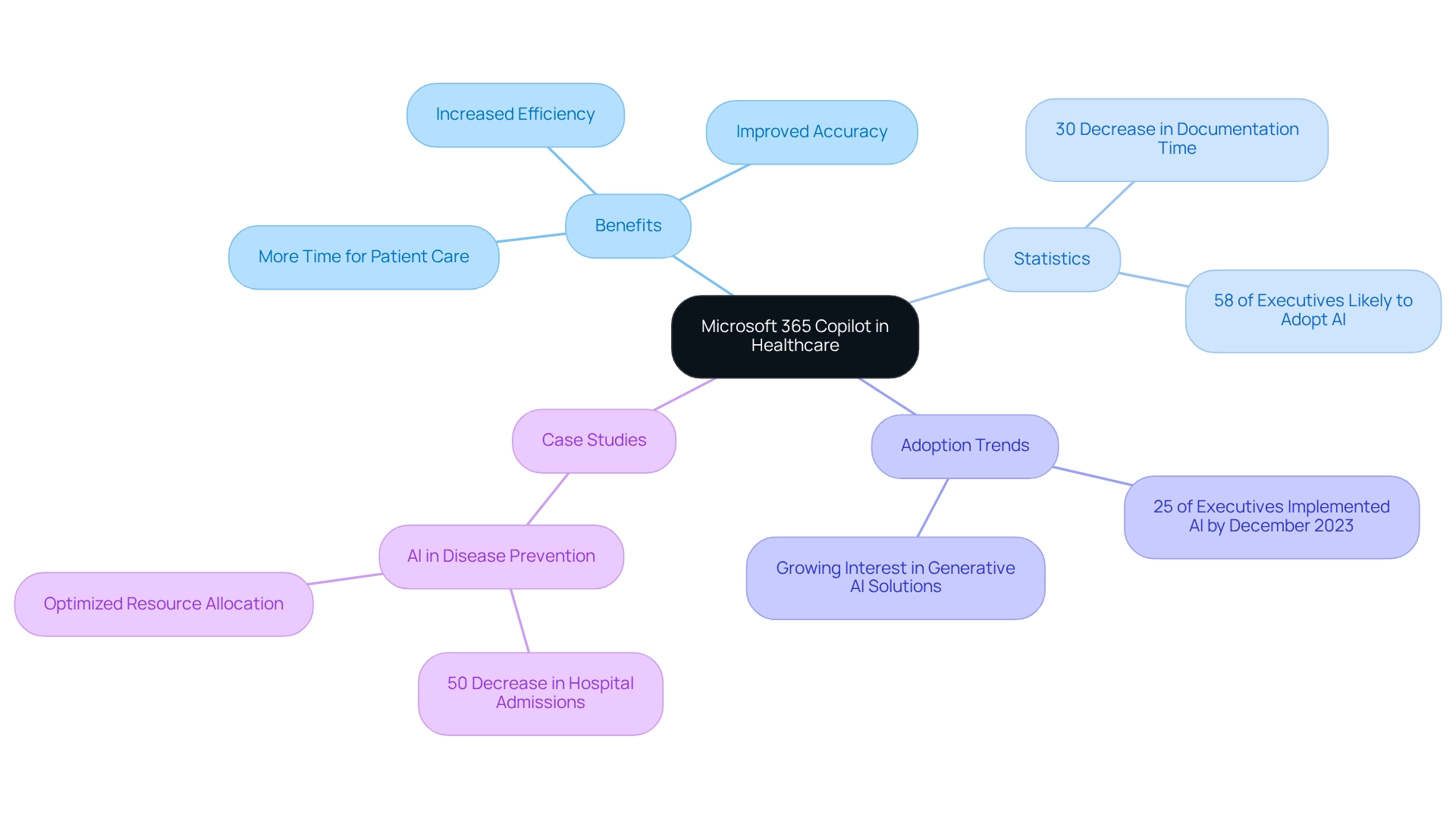
AppTek: Improving Telehealth Communication with Language Technologies
In the realm of telehealth, communication can be a daunting challenge for healthcare providers. Many doctors feel hesitant to embrace innovative solutions, often due to the overwhelming administrative burdens that accompany them. This reluctance can significantly impact patient care, leaving providers grappling with the complexities of delivering effective services.
AppTek steps in to alleviate these concerns by utilizing advanced language technologies that enhance communication within telehealth environments. By utilizing their AI technology app for real-time translation and transcription services, they effectively break down language barriers that can hinder healthcare delivery. This is particularly beneficial for diverse patient demographics, ensuring that no one is left behind.
For instance, during a recent telehealth pilot program, AppTek's technology enabled a healthcare provider to communicate seamlessly with non-English speaking individuals. The result? Increased satisfaction and adherence to treatment plans, showcasing the profound impact of effective communication. This innovation not only fosters inclusive care but also reassures doctors that quality can be maintained during the adoption of new technologies.
Consider this: effective communication in medical care can lead to a remarkable 30% increase in individual adherence to treatment plans. This statistic underscores the critical role that play in enhancing patient outcomes. As we look towards the future, advancements in AI technology app for speech translation are continually refining these tools, ensuring they meet the evolving needs of medical settings.
As Dr. Eric Topol poignantly noted, "The crowd will see you now, the individual will see you now, Dr. Google will see you now, the robot will see you now, the avatar will see you now. Everyone will see you now. Everyone but the doctor." This statement highlights the shifting dynamics in medical communication and the urgent need for solutions that address the concerns of healthcare providers.
By establishing feedback mechanisms, users can report issues and suggest improvements, fostering a collaborative environment that enhances the overall effectiveness of these communication tools. As we approach 2025, the influence of real-time translation in telehealth environments is poised to revolutionize experiences for individuals, making medical services more accessible and equitable for all.
Moreover, as Rick Ratliff pointed out, the lines between clinical and consumer wellness solutions are increasingly merging. This convergence further emphasizes the importance of AppTek's technology in today's medical landscape, reminding us that together, we can create a more compassionate and effective healthcare system.
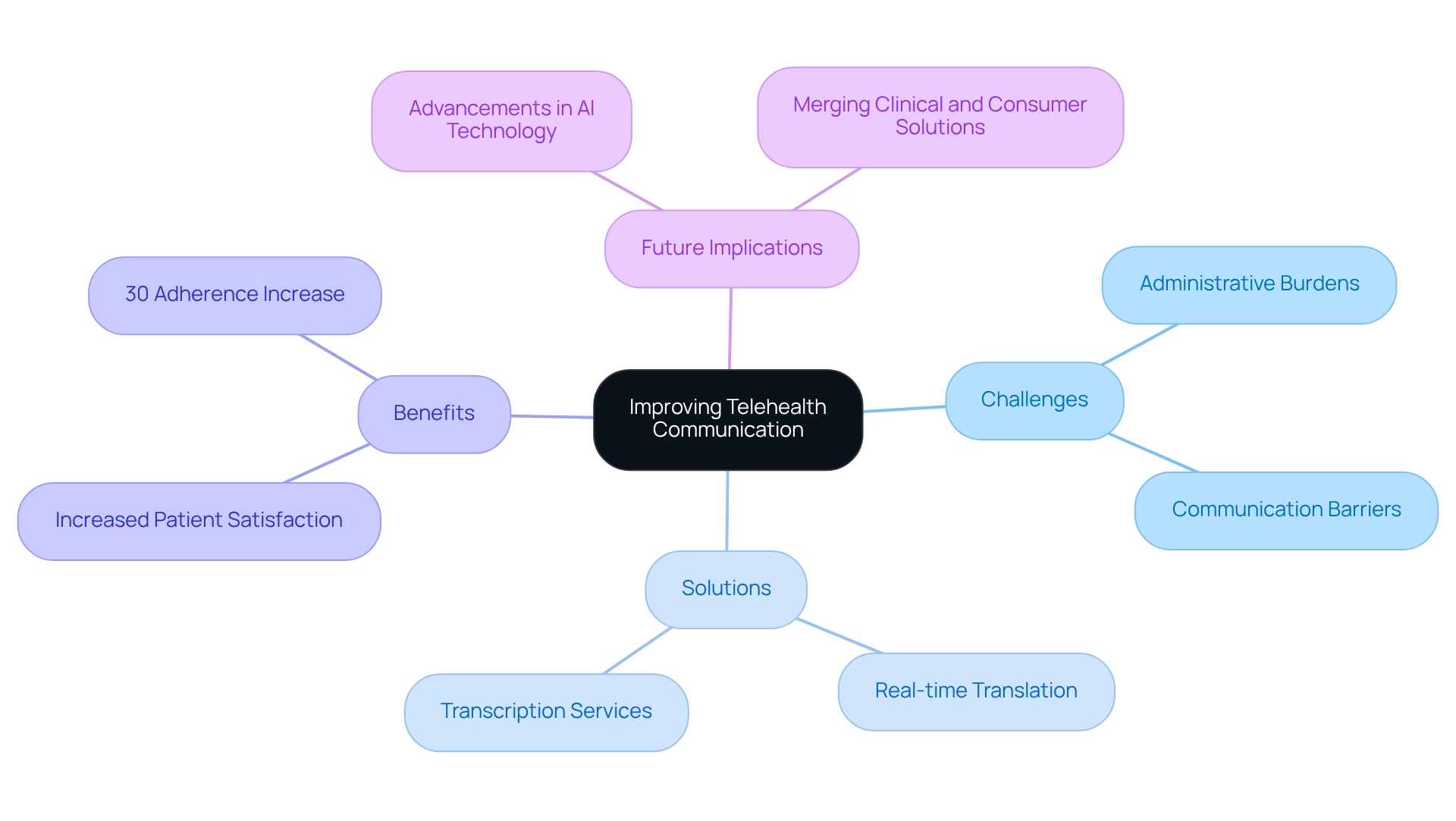
Affectiva: Leveraging Emotion AI for Enhanced Patient Care
Affectiva's Emotion AI technology is at the forefront of analyzing non-verbal signals, such as facial expressions and body language, providing medical professionals with vital insights into their clients' emotional states. By interpreting these emotional signals, healthcare providers can tailor their interactions, creating a more empathetic and supportive environment for patients. This personalized approach not only enhances client satisfaction but also significantly improves the overall quality of care.
As James Merlino, Chief Clinical Transformation Officer at Cleveland Clinic, wisely noted, "In today’s competitive medical environment, concentrating on user experience is crucial for organizational success." Integrating emotion recognition technology into a cohesive system can lead to better patient engagement and adherence to treatment plans, ultimately resulting in improved health outcomes. For instance, a multi-site observational study revealed that AI-enabled self-referral tools resulted in a 15% increase in total referrals, especially among underserved groups.
However, medical startups like Affectiva often face resistance to innovation within the sector. Many practitioners are understandably risk-averse, concerned about maintaining the quality of service. By addressing these valid concerns and showcasing the integrated benefits of AI solutions, such as Emotion AI, startups can effectively engage medical providers. As the landscape of medical services continues to evolve, the role of emotional intelligence, supported by AI, becomes increasingly essential in delivering compassionate and effective care.
CosmaNeura stands out as the only company developing [AI solutions tailored for the billion-dollar faith-oriented medical sector](https://cosmaneura.com), highlighting the importance of such technologies in enhancing treatment. Together, we can navigate these challenges and embrace the future of healthcare with empathy and understanding.
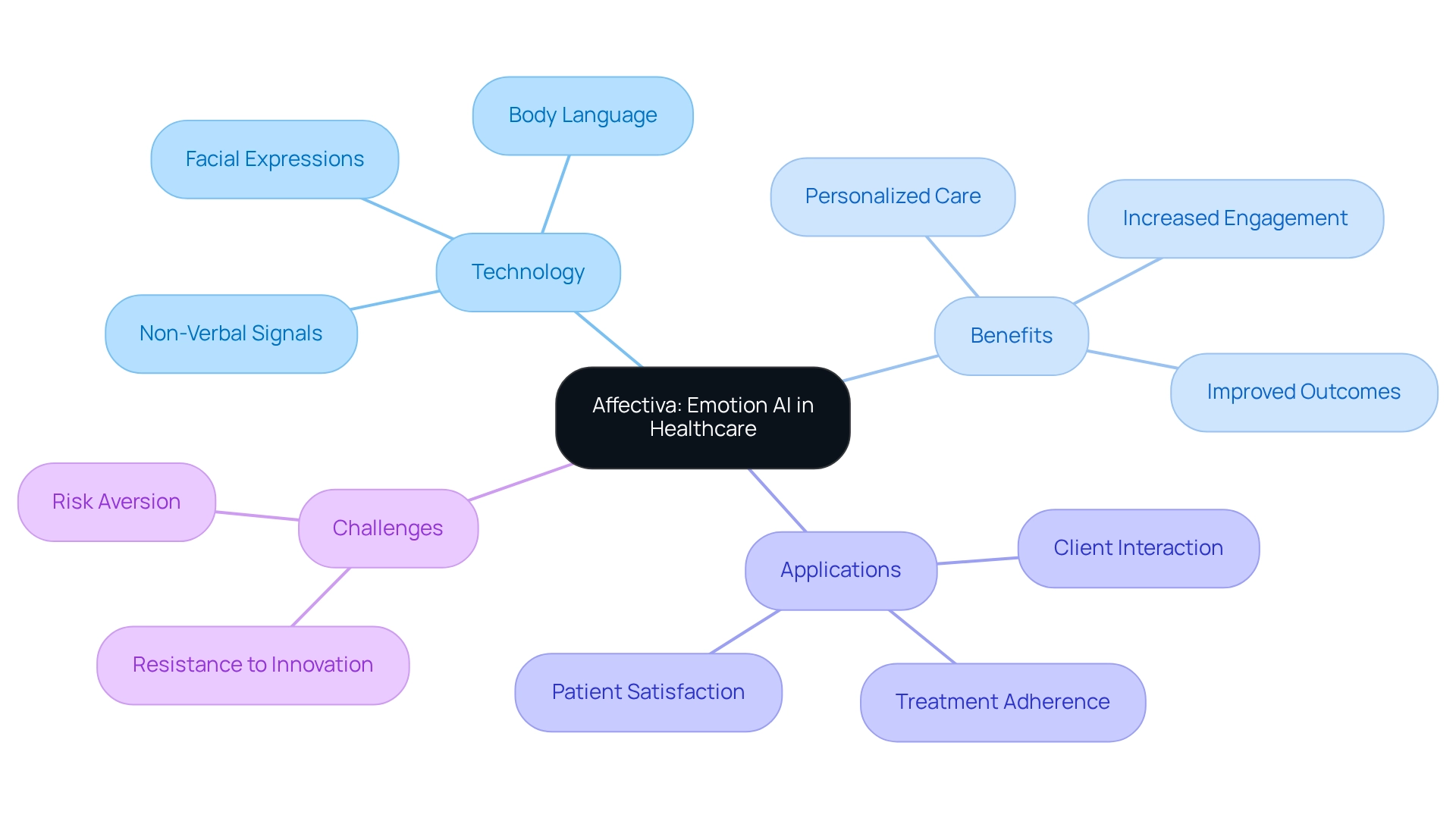
Firebase Studio: Building Efficient Healthcare Applications with AI
In the fast-paced world of healthcare, providers often face emotional challenges that can hinder their ability to deliver the best patient care. Firebase Studio provides a robust platform that empowers developers to swiftly and efficiently create for the medical field. By providing a cohesive environment for building, testing, and deploying applications, Firebase Studio significantly accelerates the development lifecycle. This swift rollout capability enables medical organizations to implement innovative solutions that enhance individual treatment and boost operational efficiency, addressing urgent issues like disjointed services and rising costs.
Imagine a scenario where seamless communication and coordination among medical professionals is the norm rather than the exception. Firebase Studio helps reduce the fragmentation of services, ensuring continuity of support for patients. Furthermore, it alleviates physician burnout by optimizing workflows and automating repetitive tasks, allowing medical professionals to focus more on direct patient interactions. As a result, medical providers can anticipate improved health outcomes, driven by the effective integration of the AI technology app that bridges gaps in care delivery. Research shows that organizations utilizing the AI technology app in their application development processes can achieve deployment times up to 30% quicker. This highlights the transformative potential of platforms like Firebase Studio in the medical field.
However, as noted by the Keragon Team, only 25% of medical executives had adopted generative AI solutions as of December 2023. This underscores the essential role that platforms like Firebase Studio play in enabling this transition, and the development of AI technology apps for the billion-dollar faith-focused medical sector by CosmaNeura showcases the potential for growth and innovation in niche markets. Vention emphasizes the importance of utilizing AI efficiently and responsibly, a crucial consideration for medical organizations navigating this ever-changing environment.
The varied uses of the AI technology app in medical settings, as illustrated by market segmentation research, further highlight the possibilities available for developers using Firebase Studio to enhance patient-focused support and improve practitioner efficiency. In conclusion, embracing tools like Firebase Studio can significantly alleviate the burdens faced by healthcare providers, ultimately leading to better patient care. Are you ready to explore how these innovations can transform your practice?
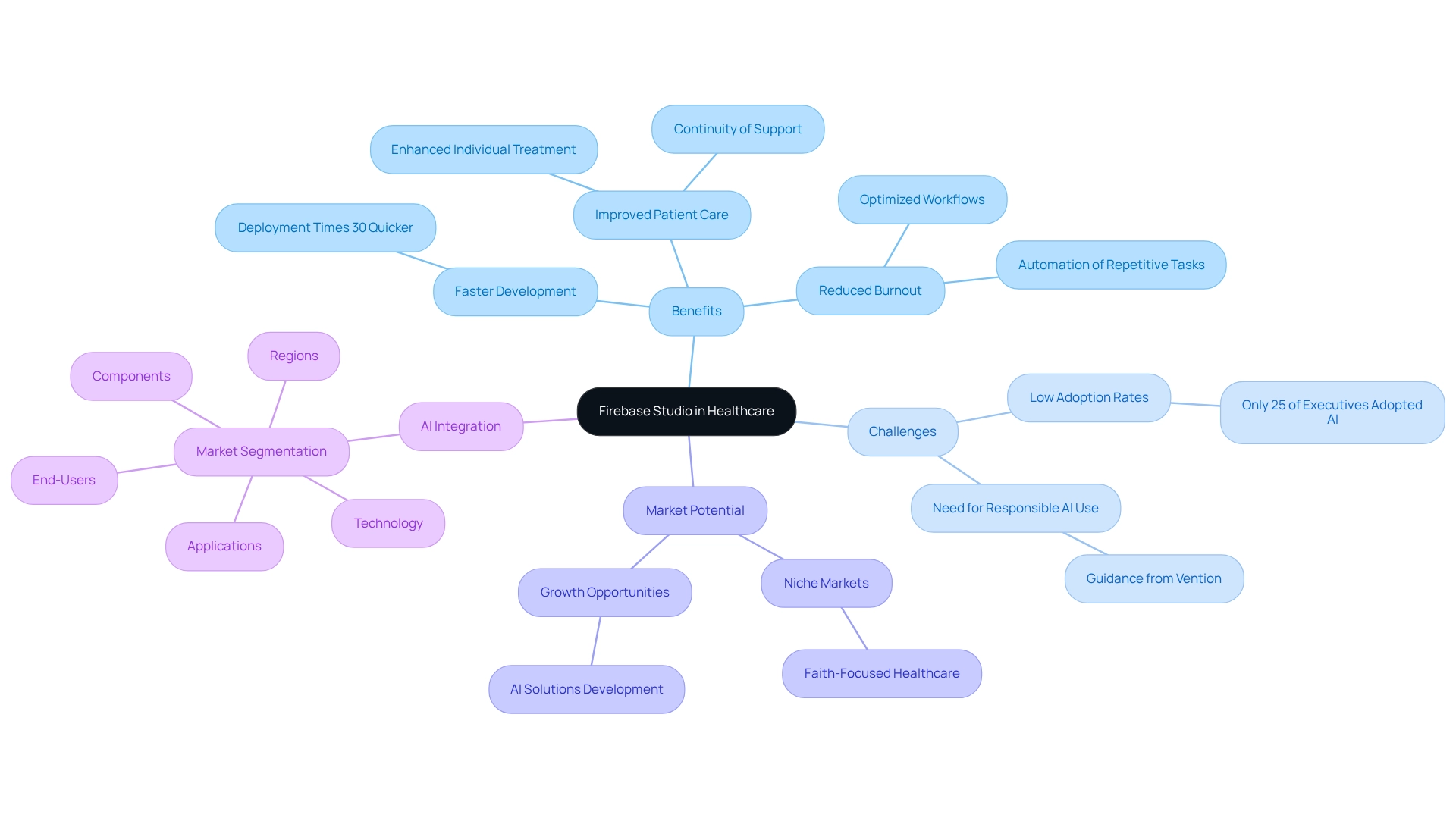
DataRobot: Empowering Healthcare with AI-Driven Insights
CosmaNeura's AI technology app is designed to empower medical organizations, particularly those rooted in faith, by harnessing the power of data analytics to enhance decision-making and improve administrative efficiency. Are you feeling overwhelmed by the demands of appointment scheduling and medical record management? Our platform automates these time-consuming tasks, allowing clinicians to reclaim precious time to focus on what truly matters: providing high-quality care. This capability not only enhances clinical outcomes but also streamlines operational processes, leading to .
In 2021, over 100 drug and biological applications were submitted to the FDA using AI and machine learning, highlighting the growing reliance on these transformative technologies in clinical settings. CosmaNeura's solutions are thoughtfully crafted to similarly improve clinical results for our target audience, ensuring that service delivery aligns with Catholic teachings. Moreover, the use of predictive analytics has shown a remarkable decrease in hospital admissions and medical expenses, all while enhancing the quality of life for individuals living with chronic illnesses.
For instance, our platform's AI-driven insights can lead to personalized treatment plans that not only improve outcomes for individuals but also adhere to ethical standards. Such examples illustrate the profound impact of CosmaNeura's AI technology app on clinical decision-making and individual care, positioning the company as a leader in faith-centered analytics for 2025 and beyond. We invite you to explore how our innovative approach can support your mission and enhance the care you provide.
Verbit: Ensuring Accurate Documentation in Healthcare
In today's healthcare landscape, providers face significant emotional challenges, particularly with the administrative burdens that can detract from patient care. Verbit excels in offering that enhance the precision of medical documentation, addressing one of the critical issues in medical service delivery. By automating the transcription process, Verbit minimizes the risk of human error, thereby improving the reliability of medical records.
This technology is essential for complying with medical regulations and ensuring clinicians have access to accurate information, which is vital for enhancing safety and quality of services. Have you ever wondered how much time could be saved if your documentation was flawless? In fact, studies indicate that nearly 64% of clinicians in regions like South America and Asia Pacific anticipate that AI will significantly influence their decision-making within the next decade. With an impressive accuracy rate of 98.86%, Verbit's transcription services truly stand out as a game-changer for medical transcriptionists.
As the medical field continues to evolve, the importance of precise medical documentation cannot be overstated; it is fundamental to effective care and safety. Expert opinions emphasize that incorporating AI in transcription not only improves documentation accuracy but also streamlines workflows. This allows providers to focus more on patient interactions rather than being bogged down by administrative tasks.
This shift is crucial as the medical landscape increasingly relies on technology to enhance outcomes and efficiency. Notta emphasizes, 'We guarantee accuracy and ease of use,' reinforcing the value of AI in this context. Moreover, insights from the case study 'Doctors' Perspectives on AI' reveal that medical professionals across various specialties express differing levels of optimism regarding AI's role. This underscores the need for targeted education and training on AI technologies, and by embracing these advancements through an AI technology app like Verbit, the medical sector can pave the way for a more efficient, patient-centric, and sustainable future. Let’s work together to create a healthcare environment that prioritizes both accuracy and compassionate care.
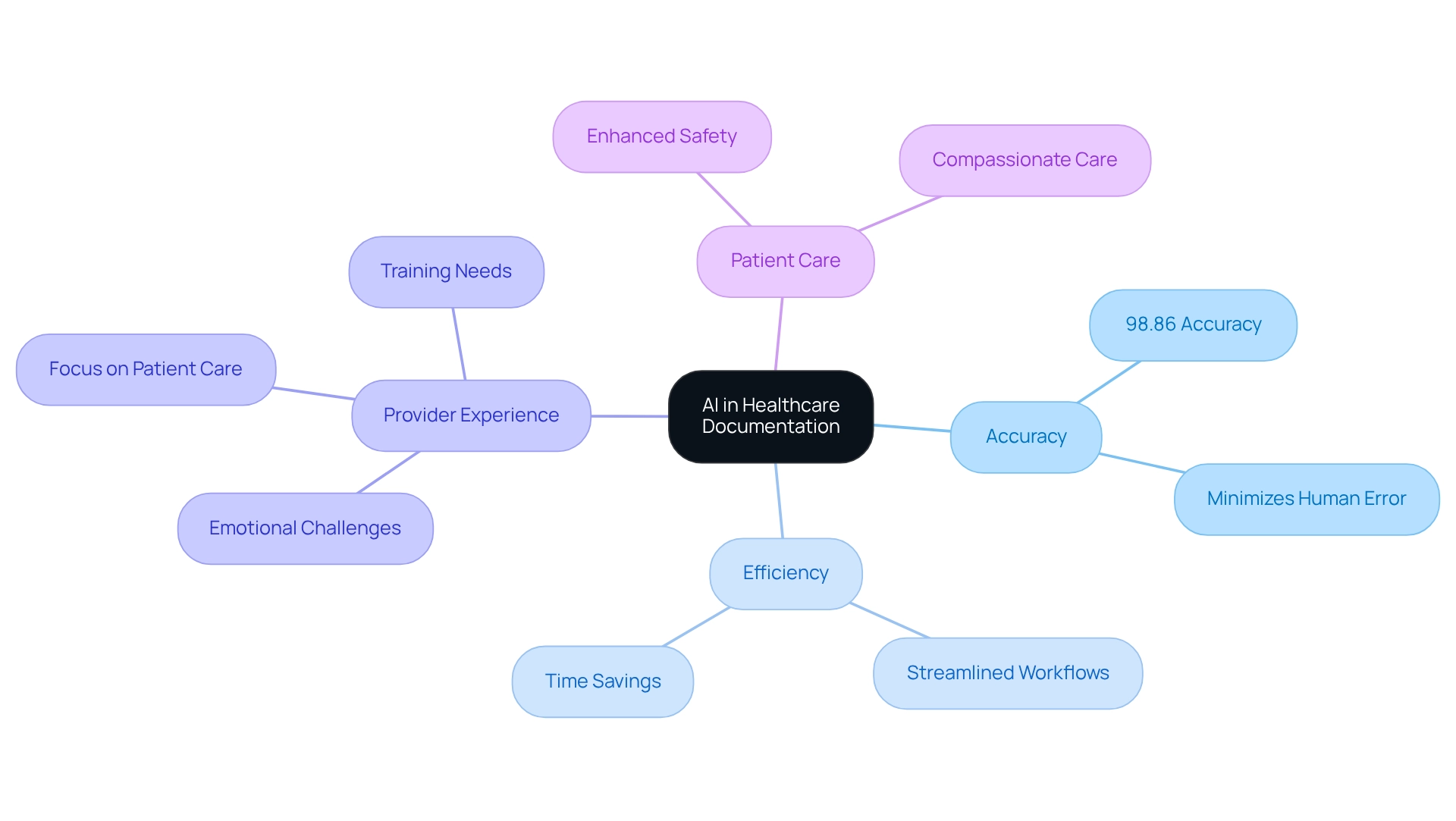
Zapier: Automating Workflows to Reduce Administrative Burdens in Healthcare
The incorporation of automation tools in the medical field is transforming the landscape, significantly alleviating administrative burdens. However, we understand that involving medical practitioners, especially physicians, in this transition can be challenging due to their natural resistance to innovation. Many physicians are understandably cautious, concerned that new technologies might compromise the quality of service and client interactions. Therefore, it is essential for medical startups to address these worries empathetically when initiating technology sales discussions.
By automating routine tasks such as appointment scheduling and client follow-ups, medical providers can reclaim valuable time. This enables clinicians to focus on what truly matters—providing high-quality care. Such efficiency not only enhances service quality but also fosters improved client satisfaction and outcomes. Addressing the concerns of doctors regarding automation is vital to support this transition and ensure that the advantages of technology are fully realized.
The impact of workflow automation in medical services is profound. Studies indicate that automating workflows can enhance productivity, reduce operational costs, and improve customer satisfaction. In fact, 51% of businesses have already adopted marketing automation, reflecting a broader trend towards efficiency across industries. This trend is particularly significant in the medical field, where the automation sector is poised for considerable growth, driven by technological advancements and digital change.
For instance, the National Institute of Health reported that in 2023, over 11 million robotic surgeries were conducted globally. This statistic highlights the crucial role of automation in improving surgical accuracy and treatment. Additionally, wearable devices have revolutionized diagnostics and , facilitating telehealth appointments and ensuring adherence to treatment plans. This integration of technology not only makes medical services more accessible but also underscores the importance of automation tools in reducing administrative tasks and improving clinical workflows.
As we approach 2025, the role of automation tools in the medical field will continue to expand. This emphasizes the need for solutions that align with the values and operational requirements of service providers, particularly those centered on faith-based care. Understanding and addressing the concerns of medical professionals will be essential to overcoming resistance and effectively implementing these innovative solutions.
Gong.io: Optimizing Revenue Workflows in Healthcare
In the demanding world of healthcare, providers often face emotional challenges that can hinder their ability to deliver quality patient care. CosmaNeura understands these struggles and leverages an AI technology app to examine customer interactions, significantly enhancing revenue processes in faith-oriented medical organizations. As the only firm dedicated to developing an AI technology app for the billion-dollar faith-focused medical market, CosmaNeura provides actionable insights into sales and operational performance. This empowers medical professionals to identify areas for enhancement, optimizing their revenue cycle processes.
Imagine a scenario where administrative burdens no longer overshadow the commitment to patient care. By optimizing these processes, healthcare providers can not only improve their financial performance but also strengthen the sustainability of their services. This allows practitioners to uphold high-quality support for their patients. For instance, organizations using CosmaNeura's platform have reported enhanced efficiency in their revenue cycle management, leading to improved financial outcomes.
As Michael Restuccia highlighted, the vaccine rollout process exemplifies the successful integration of 'people, process, and technology,' which is crucial for optimizing workflows. Furthermore, the case study of OSF HealthCare, which implemented named Clare, illustrates the concrete advantages of AI in medical services. Clare has saved the organization $1.2 million in contact center expenses while enhancing overall satisfaction among individuals receiving care, demonstrating the necessity of an AI technology app like those offered by CosmaNeura as the healthcare landscape evolves. It ensures that providers can navigate the complexities of revenue generation while maintaining their focus on patient care. Are you ready to explore how these solutions can transform your practice and support your mission to provide exceptional care?
Conclusion
The integration of advanced technologies in healthcare is not merely a trend; it signifies a fundamental shift towards enhancing patient care and operational efficiency. Innovations like CosmaNeura, Google Gemini 2.0, and Microsoft 365 Copilot are streamlining administrative tasks, improving patient-provider interactions, and automating documentation processes. These tools empower healthcare professionals to reclaim precious time, allowing them to focus more on delivering high-quality, compassionate care.
AI-driven solutions are addressing critical challenges in the healthcare sector. They reduce administrative burdens and break down language barriers in telehealth with platforms like AppTek. As these technologies evolve, they enhance communication and ensure that every patient feels valued and understood. The growing acceptance of AI among healthcare professionals indicates a promising future where technology complements the human touch essential to patient care.
Ultimately, advancements in healthcare technology pave the way for a more efficient, patient-centric, and sustainable future. By embracing these innovations, healthcare providers can significantly improve outcomes, satisfaction, and overall quality of care. As the industry continues to adapt, the focus remains on utilizing technology not just as a tool but as a partner in the journey towards better health for all. How can we further engage with these technologies to enhance our care? The journey towards better health is one we take together.




